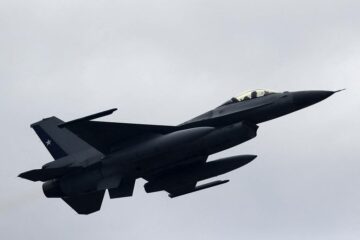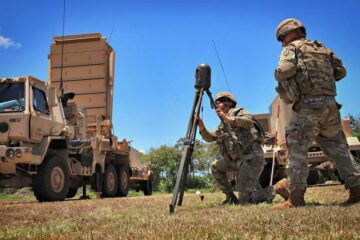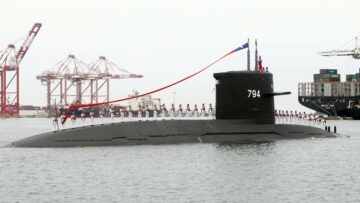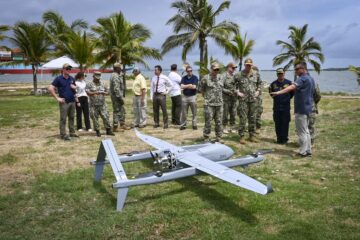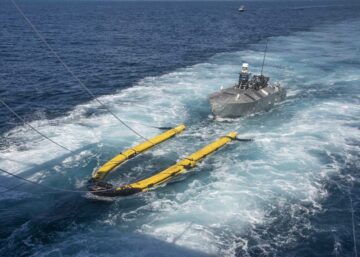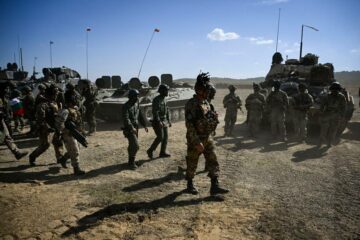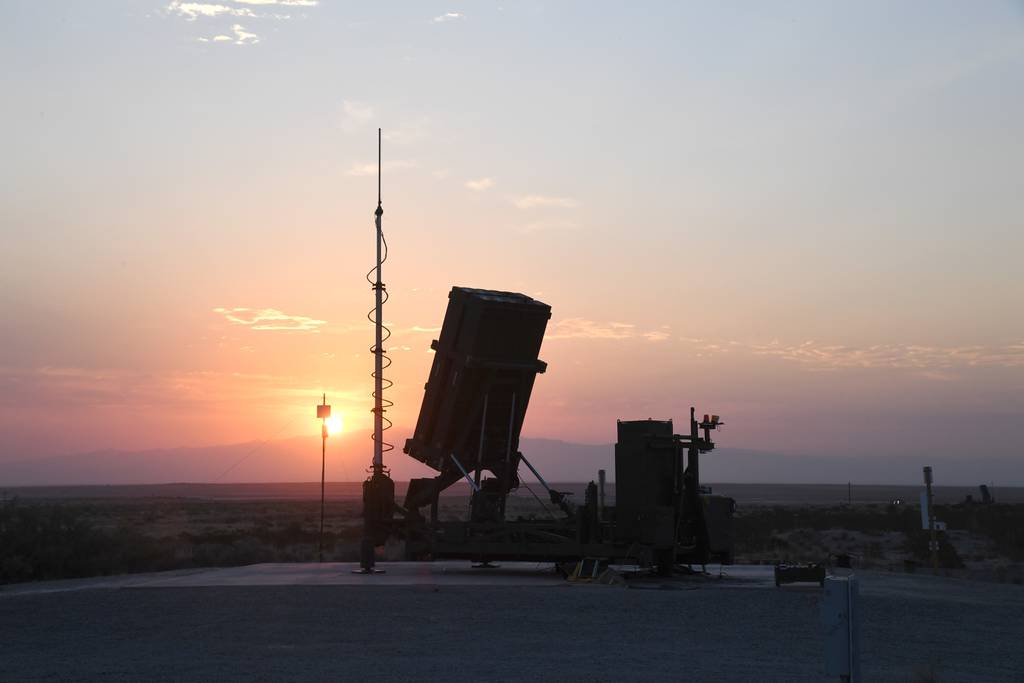
WASHINGTON — The Pentagon plans to send Israel two Iron Dome missile defense systems as the country continues to fight the militant group Hamas, according to a U.S. Defense Department official.
The transfer will aid Israel’s air defense after Hamas on Oct. 7 launched a massive, coordinated attack — making it the deadliest day for Israel in 50 years. Some 1,400 Israelis have since been killed, and Hamas continues to fire rockets from the Gaza strip.
“As we’ve said previously, the U.S. will be flowing additional Iron Dome support to Israel,” the official said. “As a result, the Department of Defense is currently engaged in planning to support the provision of U.S. Iron Dome batteries to Israel.”
The U.S. Army bought the two Iron Dome systems — manufactured by Israeli defense company Rafael Advanced Defense Systems and co-developed by RTX — at the request of Congress several years ago. The purchase was meant to fill a gap in cruise missile defense while the Army developed a longer-term countermeasure for various air and missile threats. But the service doesn’t plan to purchase more Iron Domes or to integrate the system into its air defense architecture, Army officials have told Defense News.
It has scarcely used the two batteries it has. Army personnel trained with the Iron Dome systems at Fort Bliss, Texas, before one system deployed to Guam at the end of 2021 for a two-week exercise. Otherwise, the systems have sat with a unit at Joint Base Lewis-McChord in Washington state.
The official, speaking on background to discuss the transfer, did not specify under what arrangement the batteries will be provided, nor did the official say whether the batteries will be returned to the U.S. should they survive combat.
U.S. Defense Secretary Lloyd Austin recently announced the Defense Department is also deploying a Terminal High Altitude Area Defense battery and Patriot air defense battalions to the region.
By providing Iron Domes, the U.S. continues to widen the spigot of security aid entering Israel. In the week after Hamas’ attack, Pentagon and Israeli officials announced the arrival of American aircraft stocked with air defense supplies and munitions. It has since expanded this aid to include artillery rounds, armored vehicles and precision-guided munitions, according to Israeli and American officials.
The supply effort is just one stream in a larger outpouring of American support.
One carrier strike group — led by the U.S. Navy aircraft carrier Gerald R. Ford — has already deployed to the Eastern Mediterranean. Another is on its way to the Persian Gulf. Meanwhile, a Marine expeditionary unit and 2,000 troops are readying themselves to deploy within a day if given orders by the White House, said Pentagon spokeswoman Sabrina Singh.
Austin, Secretary of State Antony Blinken and President Joe Biden have all visited the country, pledging continued U.S. support. In a nighttime address from the Oval Office, the president asked Congress for more than $100 billion in supplemental security aid, including $14.3 billion for Israel. The aid so far has not come with conditions that Israel limit civilian casualties.
Still, U.S. officials in the last week have publicly called on its closest Middle Eastern ally to obey the laws of war. As Israel retaliates, some 5,000 people in Gaza have been killed so far, according to the Gaza Health Ministry, which is run by Hamas.
With more than 2,000 rockets intercepted, Iron Dome is among the most statistically successful air defense system in the world, said Tom Karako, director of the missile defense project at the Center for Strategic and International Studies think tank.
“This is a system that was built to defend [against] certain kinds of threats, especially the kinds of threats that Israel is facing,” Karako said.
Each battery consists of three main parts: a radar, a command-and-control system, and the launchers that fire interceptors. Each of these, Karako argued, will be useful for Israel, as extra radars will increase their ability to detect threats, while more launchers and command-and-control technology will help defend more Israeli territory from rocket fire.
Should the war widen beyond the Gaza strip, the Lebanese militant group Hezbollah has tens of thousands of rockets it could fire, said Karako.
This week, Israel’s military said its aircraft had struck two Hezbollah cells, which the country said were preparing to launch rockets across the border.
Noah Robertson is the Pentagon reporter at Defense News. He previously covered national security for the Christian Science Monitor. He holds a bachelor’s degree in English and government from the College of William & Mary in his hometown of Williamsburg, Virginia.
Bryant Harris is the Congress reporter for Defense News. He has covered U.S. foreign policy, national security, international affairs and politics in Washington since 2014. He has also written for Foreign Policy, Al-Monitor, Al Jazeera English and IPS News.
Jen Judson is an award-winning journalist covering land warfare for Defense News. She has also worked for Politico and Inside Defense. She holds a Master of Science degree in journalism from Boston University and a Bachelor of Arts degree from Kenyon College.
- SEO Powered Content & PR Distribution. Get Amplified Today.
- PlatoData.Network Vertical Generative Ai. Empower Yourself. Access Here.
- PlatoAiStream. Web3 Intelligence. Knowledge Amplified. Access Here.
- PlatoESG. Carbon, CleanTech, Energy, Environment, Solar, Waste Management. Access Here.
- PlatoHealth. Biotech and Clinical Trials Intelligence. Access Here.
- Source: https://www.defensenews.com/pentagon/2023/10/24/us-agrees-to-send-two-iron-dome-batteries-to-israel/
- :has
- :is
- :not
- 000
- 1
- 20
- 2014
- 400
- 50
- 50 Years
- 7
- 70
- a
- ability
- According
- across
- Additional
- address
- advanced
- Affairs
- After
- against
- ago
- Aid
- AIR
- aircraft
- AL
- All
- Ally
- already
- also
- American
- among
- an
- and
- announced
- Another
- Antony Blinken
- architecture
- ARE
- AREA
- argued
- Army
- arrangement
- arrival
- Arts
- AS
- asked
- At
- attack
- austin
- award-winning
- background
- base
- batteries
- battery
- BE
- been
- before
- Beyond
- biden
- Billion
- border
- boston
- Boston University
- bought
- built
- but
- by
- called
- Cells
- Center
- certain
- closest
- College
- combat
- come
- company
- conditions
- Congress
- consists
- continued
- continues
- coordinated
- could
- country
- covered
- covering
- cruise
- Currently
- day
- Defense
- Defense Department
- Degree
- Department
- department of defense
- deploy
- deployed
- deploying
- detect
- developed
- DID
- Director
- discuss
- Doesn’t
- each
- eastern
- effort
- end
- engaged
- English
- entering
- especially
- Ether (ETH)
- Exercise
- expanded
- extra
- facing
- far
- fight
- Fire
- Flowing
- For
- Ford
- foreign
- foreign policy
- Fort
- from
- gap
- given
- Government
- Group
- gulf
- had
- hamas
- Have
- he
- Health
- help
- High
- his
- holds
- House
- HTTPS
- if
- images
- in
- include
- Including
- Increase
- inside
- integrate
- International
- into
- Israel
- Israeli
- IT
- ITS
- joe
- Joe Biden
- joint
- journalism
- journalist
- jpg
- just
- just one
- Land
- larger
- Last
- launch
- launched
- Laws
- Lebanese
- Led
- LIMIT
- Main
- Making
- manufactured
- Marine
- massive
- master
- meant
- Meanwhile
- Mediterranean
- Middle
- Military
- ministry
- Monitor
- more
- most
- National
- national security
- news
- nor
- Oct
- of
- Office
- official
- officials
- on
- ONE
- or
- orders
- otherwise
- parts
- pentagon
- People
- plan
- planning
- plans
- plato
- Plato Data Intelligence
- PlatoData
- policy
- politics
- preparing
- president
- president joe biden
- previously
- project
- provided
- providing
- provision
- publicly
- purchase
- R
- radar
- Rafael
- Readying
- recently
- region
- reporter
- request
- result
- rocket
- rounds
- rtx
- Run
- s
- Said
- say
- Science
- secretary
- security
- send
- service
- several
- she
- should
- since
- So
- so Far
- some
- speaking
- State
- statistically
- Strategic
- stream
- strike
- Strip
- studies
- successful
- supplies
- supply
- support
- survive
- system
- Systems
- tank
- Technology
- tens
- Terminal
- territory
- than
- that
- The
- the world
- their
- themselves
- These
- they
- Think
- think tank
- this
- thousands
- threats
- three
- to
- told
- tom
- trained
- transfer
- two
- u.s.
- U.S. Navy
- under
- unit
- university
- us
- used
- useful
- various
- Vehicles
- virginia
- visited
- war
- was
- washington
- washington state
- Way..
- week
- were
- What
- whether
- which
- while
- white
- White House
- widen
- will
- william
- with
- within
- worked
- world
- written
- years
- zephyrnet

